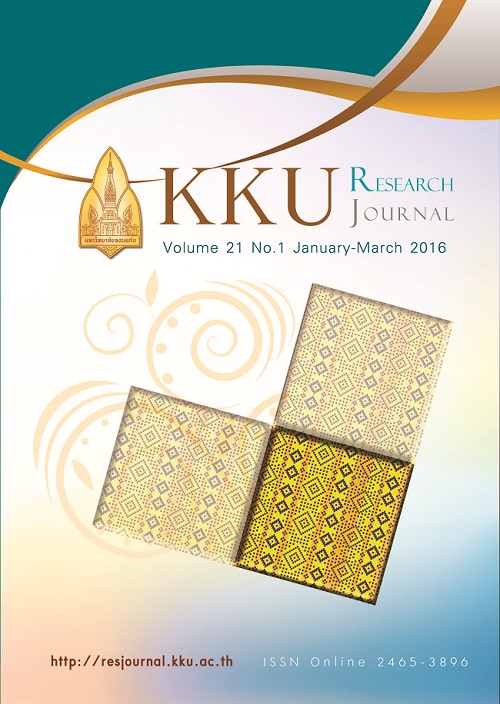Outcome of laparoscopic sleeve gastrectomy for treatment morbidly obese patients in Srinagarind hospital
Main Article Content
Abstract
Background: Laparoscopic sleeve gastrectomy (LSG) has been increasingly popular procedure for treatment morbidly obese patients and showing good weight loss and resolution of comorbidity diseases. The objective of this study was to evaluate postoperative outcome in term of operative complication, weight loss and comorbidity improvement after laparoscopic sleeve gastrectomy.
Methods: From July 2011 to December 2014 there is 70 patients (45 woman; 64 percent) with an average age of 37.7 years (range; 17-62 years), mean body weight was 126.5 kg (range; 83-250 kg), mean BMI was 45.7 kg/m2 (range; 33-77 kg/m2) who underwent laparoscopic sleeve gastrectomy for treatment morbid obesity. Postoperative time, 1st day postoperative pain, postoperative complication and postoperative follow up data for the body weight change, percent EWL, BMI and improvement of comorbidity at the 6th, 9th,12th, 18th, and 24th months were recorded.
Results: The mean operative time was 75 minutes. The mean operative blood loss was 20 ml. The mean 1st day postoperative pain score was 4. No conversion to laparotomy had to be performed. The mean percentages of excessive body weight loss (EWL) were 46.78 percent at 6 months, 59.75 percent at 1 year, 64.53 percent at 18 months, and 62.92 percent at 2 years. The mean BMI were 35.57 kg/m2 at 6 months, 32.69 kg/m2 at 1 year, 29.23 kg/m2 at 18 months, and 29.45 kg/m2 at 2 years. The rate of resolution of OSA was 65.7 percent and improvement of OSA was 31.4 percent. The rate of resolution of hypertension was 68.9 percent and improvement of hypertension was 31.1 percent. The rate of resolution of DM was 70 percent and improvement of DM was 30 percent. The rate of postoperative complication was 4.2 percent.
Conclusions: Laparoscopic sleeve gastrectomy is safe and effective procedure for treatment morbidly obese patients. However, weight regained need to evaluated in long term follow up.
Article Details
References
[2] Bohdjalian A, Langer FB, Shakeri-Leidenmühler S, Gfrerer L, Ludvik B, Zacherl J, et al. Sleeve gastrectomy as sole and definitive bariatric procedure: 5-year results for weight loss and ghrelin. Obes Surg. 2010 May;20(5):535–40.
[3] Melissas J, Koukouraki S, Askoxylakis J, Stathaki M, Daskalakis M, Perisinakis K, et al. Sleeve gastrectomy: a restrictive procedure? Obes Surg. 2007 Jan;17(1):57–62
[4] Shi X, Karmali S, Sharma AM, Birch DW. A review of laparoscopic sleeve gastrectomy for morbid o b e s i t y. O b e s S u rg . 2 0 1 0 Aug;20(8):1171–7.
[5] Diamantis T, Apostolou KG, Alexandrou A, Griniatsos J, Felekouras E, Tsigris C. Review of long-term weight loss results after laparoscopic sleeve gastrectomy. Surg Obes Relat Dis. 2014 Feb;10(1):177–83.
[6] Gluck B, Movitz B, Jansma S, Gluck J, Laskowski K. Laparoscopic sleeve gastrectomy is a safe and effective bariatric procedure for the lower BMI (35.0-43.0 kg/m2) population. Obes Surg. 2011 Aug;21(8):1168–71.
[7] Nocca D, Krawczykowsky D, Bomans B, Noël P, Picot MC, Blanc PM, et al. A prospective multicenter study of 163 sleeve gastrectomies: results at 1 and 2 years. Obes Surg. 2008 May;18(5):560–5.
[8] Lee WJ, Wang W. Bariatric surgery: Asia-Pacific perspective. Obes Surg. 2005 Jun-Jul;15(6):751-7. [9] Ferrer-Márquez M, Belda-Lozano R, Ferrer-Ayza M. Technical controversies in laparoscopic sleeve gastrectomy. Obes Surg. 2012 Jan;22(1):182–7.
[10] K u e p e r M A , K r a m e r K M , Kirschniak A, Königsrainer A, Pointner R, Granderath FA. Laparoscopic sleeve gastrectomy: standardized technique of a potential stand-alone bariatric procedure in morbidly obese patients. World J Surg. 2008 Jul;32(7):1462–5.
[11] Sieber P, Gass M, Kern B, Peters T, Slawik M, Peterli R. Five-year results of laparoscopic sleeve gastrectomy. Surg Obes Relat Dis. 2014 Apr;10(2):243–9.
[12] Van Rutte PWJ, Smulders JF, de Zoete JP, Nienhuijs SW. Outcome of sleeve gastrectomy as a primary bariatric procedure. Br J Surg. 2014 May;101(6):661–8.
[13] Zachariah SK, Chang P-C, Ooi ASE, Hsin M-C, Kin Wat JY, Huang CK. Laparoscopic sleeve gastrectomy for morbid obesity: 5 years experience from an Asian center of excellence. Obes Surg. 2013 Jul;23(7):939–46.
[14] Boza C, Salinas J, Salgado N, Pérez G, Raddatz A, Funke R, et al. Laparoscopic sleeve gastrectomy as a stand-alone procedure for morbid obesity: report of 1,000 cases and 3-year follow-up. Obes Surg. 2012 Jun;22(6):866–71.
[15] Braghetto I, Korn O, Valladares H, Gutiérrez L, Csendes A, Debandi A, et al. Laparoscopic sleeve gastrectomy: surgical technique, indications and clinical results. Obes Surg. 2007 Nov;17(11): 1442–50.
[16] Hoogerboord M, Wiebe S, Klassen D, Ransom T, Lawlor D, Ellsmere J. Laparoscopic sleeve gastrectomy: perioperative outcomes, weight loss and impact on type 2 diabetes mellitus over 2 years. Can J Surg. 2014 Apr;57(2):101–5.
[17] Melissas J, Daskalakis M, Koukouraki S, Askoxylakis I, Metaxari M, Dimitriadis E, et al. Sleeve gastrectomy-a “food limiting” operation. Obes Surg. 2008 Oct;18(10):1251–6.


